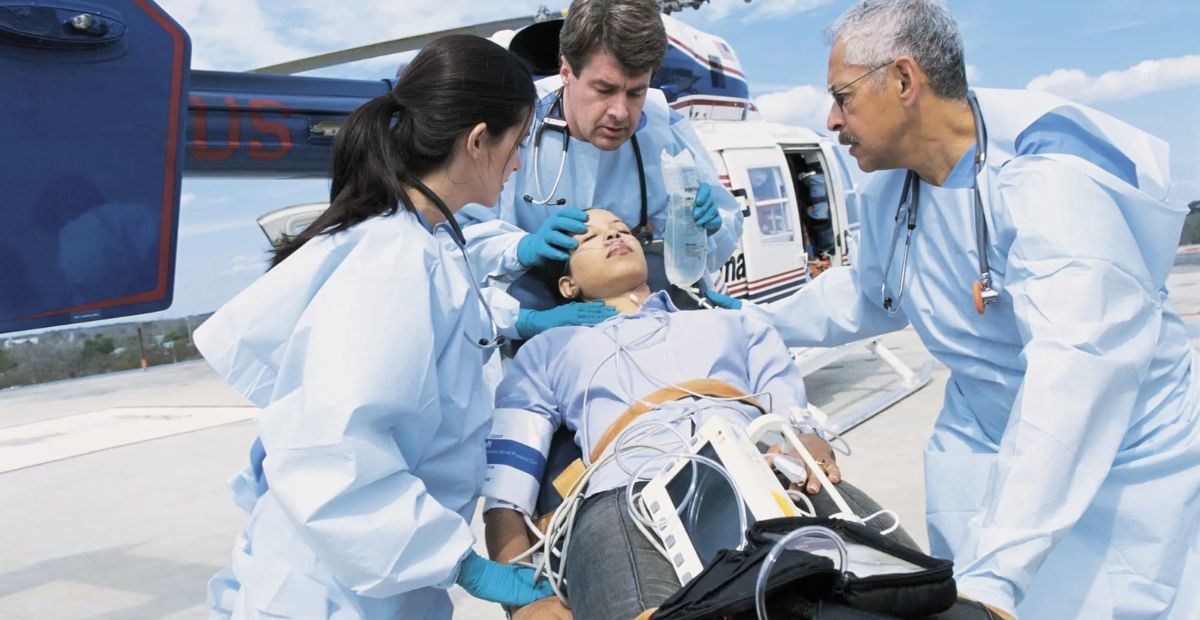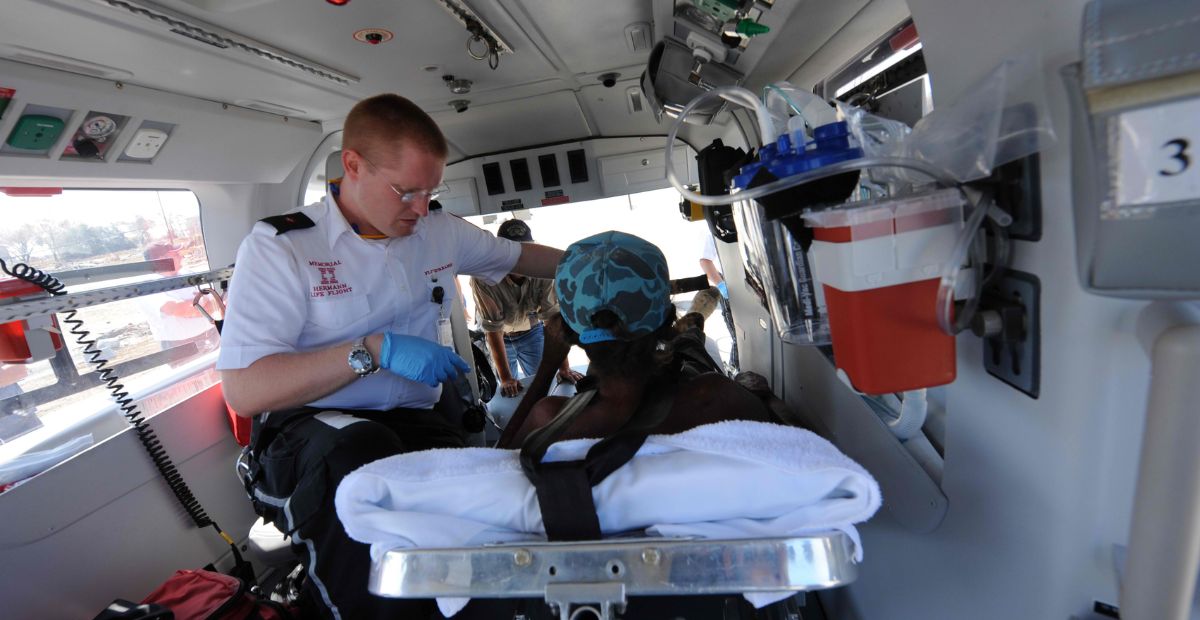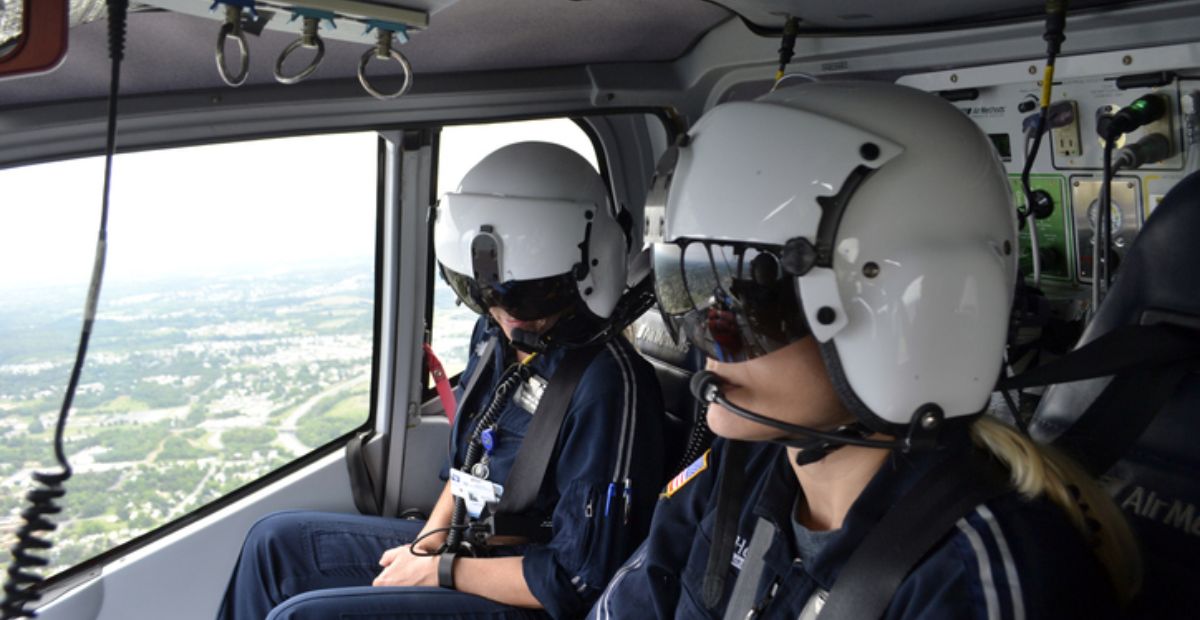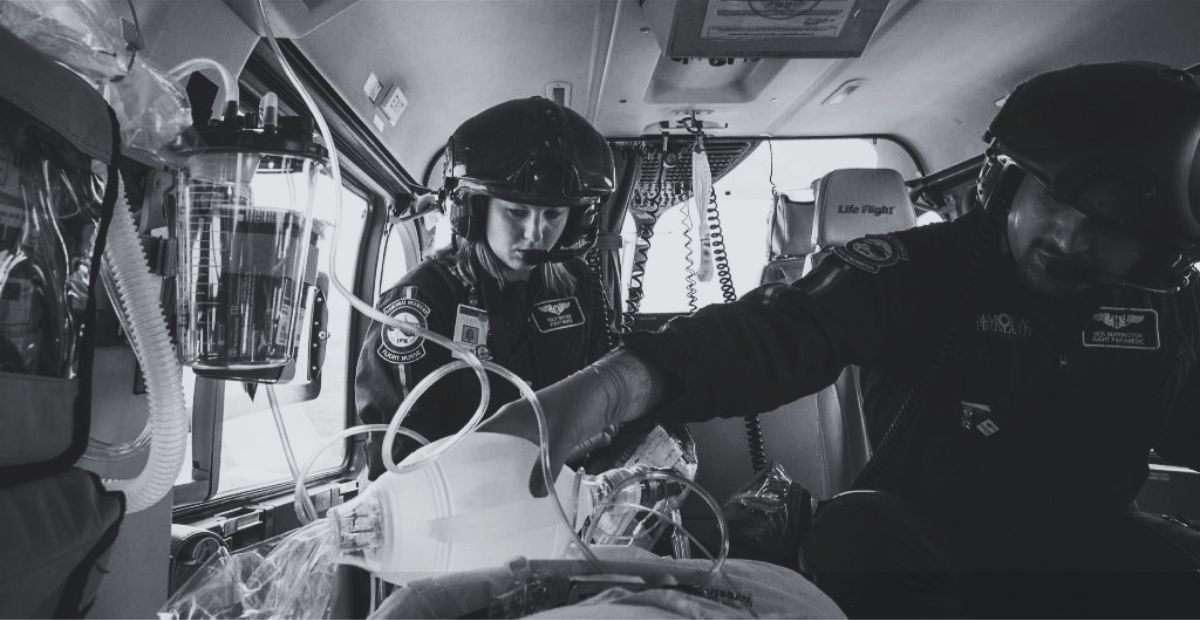If you’re interested in a career combining your passion for healthcare and flying, becoming a flight nurse might be the perfect choice.
Flight nurses are highly trained medical professionals who provide critical care to patients in emergency situations while flying on medical helicopters or airplanes.
While the role may sound exciting, becoming a flight nurse requires hard work, dedication, and specialized training.
In this article, we’ll guide you through the steps you need to take to become a flight nurse, from earning your nursing degree to gaining experience in critical care and obtaining the certifications needed to work in the field.
So, if you’re ready to take your nursing skills to new heights, let’s dive in and explore how to become a flight nurse.
Table of Contents
What Is A Flight Nurse?
If you want to know how to become a flight nurse then first you should understand what a flight nurse is. A flight nurse is a registered nurse (RN) who provides critical care to patients in flight on medical helicopters or airplanes.
Flight nurses are responsible for assessing and monitoring the patient’s condition, administering medications, performing procedures, and communicating with the medical team on the ground.
They work closely with other healthcare professionals, such as physicians, paramedics, and respiratory therapists, to provide the best possible care to the patient.
The role of a flight nurse is demanding and requires quick thinking, excellent communication skills, and the ability to work well under pressure.
What Does A Flight Nurse Do?

Knowing what a flight nurse does is the second thing in how to become a flight nurse. Flight nurses are responsible for providing advanced life support to patients during transport, often in emergency situations.
They are trained to assess and manage a wide range of medical conditions, such as trauma, cardiac events, and respiratory distress.
In addition, flight nurses must be knowledgeable about the equipment and technology used on medical helicopters and airplanes, such as ventilators, defibrillators, and monitoring devices.
They must also be able to work in a variety of environments, including unstable aircraft and harsh weather conditions.
One of the primary responsibilities of a flight nurse is to ensure the safety and well-being of the patient during transport. They must be able to communicate effectively with the patient and their family, reassuring them and providing updates on the patient’s condition.
In addition, flight nurses must be able to work as part of a team, communicating effectively with other healthcare professionals both in the air and on the ground.
How To Become A Flight Nurse: Steps To Become A Flight Nurse
Becoming a flight nurse requires education, training, and experience. Here are the steps that will tell you how to become a flight nurse:
Step 1: Nursing Education And Certifications

The first step to how to become a flight nurse is to earn a nursing degree. This can be either an Associate Degree in Nursing (ADN) or a Bachelor of Science in Nursing (BSN).
Both types of degrees will prepare you to become a registered nurse (RN), which is a requirement for becoming a flight nurse.
Once you have completed your nursing degree, you will need to obtain your RN license. This typically involves passing the National Council Licensure Examination (NCLEX-RN), which tests your knowledge and skills in nursing practice.
In addition to your nursing degree and license, there are several certifications that can help you prepare for a career as a flight nurse.
The most common certification is the Certified Flight Registered Nurse (CFRN) credential, which is offered by the Board of Certification for Emergency Nursing (BCEN).
To be eligible for the CFRN exam, you must have at least two years of nursing experience and at least 2,000 hours of experience in critical care or emergency nursing.
Step 2: Flight Nursing Training And Certifications

Here comes the second step of how to become a flight nurse. Once you have obtained your nursing degree and license, as well as any additional certifications, you will need to gain experience in critical care nursing.
This can be done by working in an emergency room, intensive care unit, or other critical care setting. Many flight nursing programs require a minimum of three years of experience in critical care nursing.
In addition to gaining experience in critical care nursing, you will need to complete specialized training in flight nursing. This can include courses in aeromedical physiology, aviation safety, and crew resource management.
Many flight nursing programs also require a minimum number of flight hours as a crew member on a medical helicopter or airplane.
Once you have completed your training, you will need to obtain any required certifications for your state or region. This can include certifications in advanced cardiac life support (ACLS), pediatric advanced life support (PALS), and neonatal resuscitation.
How To Become A Flight Nurse: Tips That Will Help You Becoming A Successful Flight Nurse
So, now as you know how to become a flight nurse, we will share some essential tips to help you become a successful flight nurse.
● Education And Experience
The first and foremost thing to becoming a successful flight nurse is to gain the necessary education and healthcare experience.
Most air ambulance services require a minimum of three to five years of critical care unit (CCU) experience, followed by additional training and certifications.
Some of the mandatory certifications include Basic Life Support (BLS), Advanced Cardiac Life Support (ACLS), and Pediatric Advanced Life Support (PALS). You must be well-versed in ventilator management, and medication administration and have excellent communication skills.
● Physical And Emotional Fitness
Before applying for the job of a flight nurse, it’s essential to evaluate whether you’re physically and emotionally fit for the role. You’ll need to work extended hours, lift patients, carry equipment, and perform other physical demands.
Moreover, an air ambulance flight can be emotionally stressful, as you’ll encounter critically ill patients and their families. You need to be resilient and maintain your composure during emergencies.
● Attention To Detail
A successful flight nurse must have excellent attention to detail. You’ll be responsible for monitoring vital signs, administering medications, and assessing patients’ health status continually.
In a high-stress environment, even the slightest mistake can have severe consequences. You must remain vigilant, and focused, and double-check everything before taking action.
● Teamwork And Communication
Flight nurses have to work in a team comprised of pilots, paramedics, and other healthcare professionals. Therefore, you need to have excellent interpersonal and communication skills.
Effective communication is crucial to ensure patient safety and a successful mission. You must be able to communicate succinctly and coordinate with the team to provide seamless healthcare services.
● Constant Learning
Medicine and healthcare are fast-changing fields, and as a flight nurse, you must keep yourself updated with the latest advancements, technology, and treatments.
You must have an insatiable thirst for knowledge and a willingness to learn continually. Attend conferences, workshops, and training programs to enhance your skills.
Benefits Of Becoming A Flight Nurse

Here are some benefits of pursuing a career as a flight nurse.
1. High-Paying Career
Flight nurse professionals are well-compensated for their hard work and expertise; an experienced flight nurse can earn up to $90,000 per year or even more.
Moreover, flight nurse jobs offer excellent benefits such as health insurance, retirement savings plan, and sick leave. This makes it an excellent opportunity for new nurse graduates to enter this field and make a good living while practicing nursing.
2. Opportunity For Professional Growth
A career as a flight nurse will stretch your expertise, requiring a wide range of nursing skills in various environments. With this comes incredible opportunities for professional growth and continuous learning.
As a flight nurse, you get to work with high-tech equipment, medications, and other flight-specific procedures. Exposure to different aspects of nursing will enhance your critical thinking and decision-making abilities, leading to overall job satisfaction and personal growth.
3. Fast-Paced And Adrenaline-Pumping
Flight nurse professionals work in dynamic and equally challenging environments, making it one of the most exciting and adrenaline-pumping careers in nursing.
You’ll never have a dull moment on this job, whether handling emergency cases, participating in life-saving procedures, or transporting critically ill or injured patients.
The fast-paced nature of this role allows for a real sense of accomplishment, knowing that you are genuinely making a difference in someone’s life every day.
4. Recognition And Appreciation
Flight nurse professionals are the unsung heroes of our healthcare industry. Whenever an emergency situation arises, people look up to these lifesavers to provide the best care possible to their loved ones.
In this role, you will work tirelessly to save lives, but with that comes recognition and appreciation.
You’ll work among a dedicated team of professionals, including EMS staff and pilots, each of whom understands the importance of your role in the emergency response system.
It’s a rewarding feeling to work with such a team, and you’ll no doubt earn the much-needed recognition and appreciation of people for doing heroic work.
5. Flexibility And Autonomy
Working as a flight nurse provides the benefit of flexibility and autonomy. With this role, you’ll enjoy flexible work schedules that align with your personal life.
You’ll also have opportunities to explore new locations and travel around the country, working in unique environments with different people.
Also, Flight nurses work alongside emergency medical service teams, giving them autonomy in caring for patients within integral protocols and procedures.
FAQs:
Now, we will answer some of the most frequently asked questions about becoming a flight nurse.
How to gain experience as a Flight Nurse?
Before becoming a flight nurse, you must first have experience in the nursing field. Most flight nurses have worked in critical care units such as emergency rooms, intensive care units, and trauma units. These units prepare nurses for the high-pressure environment of flight nursing. After obtaining your nursing degree, it is essential to gain experience in the critical care unit. You can gain experience by working in a hospital or a clinic. Critical care experience is necessary to prepare you for the challenges you will face as a flight nurse. Once you have gained enough experience, you can consider pursuing a certificate in flight nursing. The certificate program will provide you with additional knowledge and skills necessary for the job. It is essential to note that a certificate program is not a requirement to become a flight nurse, but it will give you an advantage over other candidates.
How to apply for a Flight Nurse job?
To apply for a flight nurse job, you must first meet the employment requirements. Most employers require a minimum of three to five years of critical care experience. Additionally, you must have a valid nursing license and certification in advanced cardiac life support (ACLS) and basic life support (BLS). Once you meet the employment requirements, you can start looking for job openings. You can look for job openings on various job boards, such as LinkedIn and Indeed. You can also check with local hospitals and medical facilities that offer flight nurse services. When applying for a flight nurse job, you must submit a resume and cover letter. The resume should highlight your critical care experience, education, and certification. The cover letter should explain why you are interested in the job and why you are the best candidate for the position.
What will be your life as a Flight Nurse?
As a flight nurse, you will have a challenging and rewarding career. You will work in a fast-paced and high-pressure environment. Your job will involve responding to medical emergencies and transporting critically ill patients to hospitals. Your work schedule will vary depending on your employer. Some employers offer 24-hour services, while others have scheduled shifts. You may also have to work on weekends and holidays. As a flight nurse, you will have to be physically fit and have the ability to work long hours. You will also have to have excellent communication and critical thinking skills. You will work closely with other healthcare professionals, including physicians, paramedics, and other nurses.
Conclusion
Becoming a flight nurse requires a combination of education, training, and experience. While the path to becoming a flight nurse may be challenging, the rewards are significant.
Flight nursing offers an exciting and challenging career that provides an opportunity to make a difference in the lives of patients and their families.
If you’re interested in becoming a flight nurse, start by obtaining your nursing degree and license, gaining experience in critical care nursing, and obtaining any required certifications.
With dedication and hard work, you can take your nursing skills to new heights and embark on a fulfilling career as a flight nurse.
Related Post:







